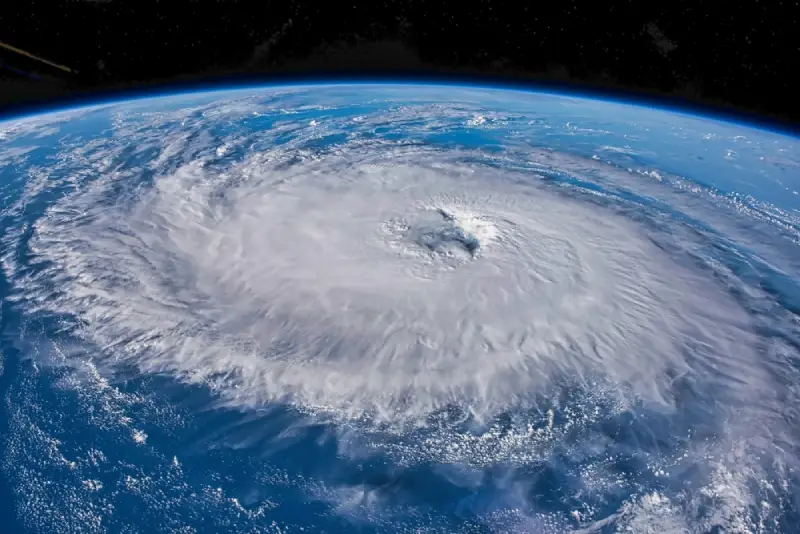
Rainbow RestorationⓇ explains the differences between a tropical storm and a hurricane, including wind speed and potential damage.
|
Tropical storms and hurricanes are both classifications of tropical cyclones. They share certain features and all have the potential to cause severe damage, but they differ significantly in strength. Understanding the distinctions is essential for proper preparation before the storm makes landfall.
What Is a Tropical Storm?
Tropical storms are localized, intense low-pressure wind systems with sustained wind speeds ranging from 39–73 mph. These storms begin to develop the pinwheel shape of a hurricane, and are often precursors to a hurricane. Once a tropical storm develops, it is given a name.
Does a tropical storm have an eye?
Some tropical storms develop an eye. As the storm intensifies, air at the center of the cyclone sinks, warming up and suppressing cloud formation. This sinking air creates a pocket of calmer weather in the middle of the storm, ranging from 20 to 40 miles in diameter.
While the surrounding eyewall contains the storm’s most severe weather and highest winds, the tropical storm eye is characterized by light winds, little to no rain, and sometimes even a clear sky.
An eye is not exclusive to tropical storms; it's more commonly a feature of stronger tropical cyclones like hurricanes and typhoons.
What Is a Hurricane?
A hurricane is a powerful, low-pressure tropical cyclone characterized by sustained wind speeds exceeding 74 mph. Hurricanes share many similarities with tropical storms, but are defined by several key features:
Wind speed and categories
The defining difference between a hurricane and a tropical storm is wind speed. Once a tropical storm sustains winds above 73 mph, it becomes classified as a hurricane and is assigned a category:
| Category | Sustained Winds | Damage |
| 1 | 74–95 mph | Some damage to roofing, siding, branches; some power outages expected. |
| 2 | 96–110 mph | Extensive damage to roofing, siding, and trees; near-total power loss expected. |
| 3 | 111–129 mph | Devastating damage to homes; uprooted trees; loss of water and power. |
| 4 | 130–156 mph | Catastrophic damage to structures; total power loss; areas made uninhabitable |
| 5 | 157 mph or higher | Catastrophic damage; homes destroyed, total power loss, areas made uninhabitable. |
While tropical storms don’t reach these wind speeds, it’s essential to remember that even less powerful storms can be incredibly dangerous and damaging due to factors such as storm surge and massive amounts of rainfall.
The eye of the hurricane
While some tropical storms may develop an eye, all hurricanes have one. The storm rotates around this central point, which can be 20 to 40 miles wide.
The eyewall
The eyewall surrounds the eye of the hurricane and is the most dangerous part of the storm. This is where the heaviest rain and most destructive winds occur. The eyewall can reach a width of up to 30 miles.
Rainbands
The hurricane's iconic pinwheel shape is created by spiral rainbands that extend from the eyewall. These are the largest part of the storm, stretching up to 300 miles long and spinning slowly counter-clockwise.
When Does a Tropical Storm Become a Hurricane?
A hurricane doesn't just appear—it's the final stage in a progression of storms, with each stage marked by increasing wind speeds:
- Tropical disturbance: This is the earliest stage, consisting of a cluster of thunderstorms with minimal wind circulation. Wind speeds are less than 23 mph.
- Tropical depression: As the disturbance strengthens, a low-pressure area forms, and winds begin to circulate. The low-pressure area is classified as a tropical depression when sustained winds reach 23–38 mph.
- Tropical storm: When sustained winds reach 39–73 mph, the storm is named and becomes a tropical storm. At this stage, the storm develops a distinct pinwheel shape and can cause significant damage, primarily due to heavy rainfall and flooding.
- Hurricane: A tropical storm officially becomes a hurricane once its sustained winds reach 74 mph or higher.
Water Damage Restoration & Reconstruction with Rainbow Restoration
Tropical cyclones can cause extensive flooding and property damage. Rainbow Restoration® provides emergency water removal, as well as residential water damage restoration, commercial water damage restoration, and reconstruction services after tropical storms, hurricanes, and other natural disasters. Call or request services online to get started.
This article is intended for general informational purposes only and may not be applicable to every situation. You are responsible for determining the proper course of action for your home and property. Rainbow Restoration is not responsible for any damages that occur as a result of this blog content or your actions. For the most accurate guidance, call the Rainbow Restoration location nearest you for a comprehensive, on-site assessment.
Tropical Storm vs. Hurricane FAQ
Setting the highest standards in water, fire, and mold damage restoration requires a continuous dedication to education and improvement. This commitment to exceptional service also includes using our years of experience and expertise to answer your restoration questions. Here are answers to some of the most frequently asked questions about tropical storms vs. hurricanes.
What is a tropical depression vs. a tropical storm?
A tropical depression is a low-pressure system that develops over tropical waters, characterized by counter-clockwise cloud rotation and sustained wind speeds ranging from 23–38 mph. A tropical depression becomes a named tropical storm when sustained wind speeds reach 39–73 mph. At this point, the storm adopts the famous pinwheel shape, resembling a hurricane.
When does a tropical storm become a hurricane?
A tropical storm becomes a hurricane when sustained wind speeds reach 74 mph or higher. While hurricanes cause significantly more damage after landfall, all tropical cyclones pose a substantial risk of storm surge and flooding.
What is the “eyewall” of a hurricane?
The eyewall is the ring of towering thunderstorms that immediately surrounds the eye of a tropical cyclone. It's the most intense part of the storm, containing the highest wind speeds, heaviest rainfall, and most violent weather. The eyewall's powerful winds and rain can cause extreme destruction.
